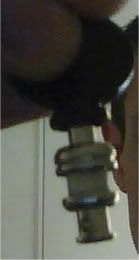Ataraxia
Well-known member
I've already posted about them before, so here's my final question concerning the subject:
How do they hold-up over time? Due to their nature, I would imagine they must require a LOT more maintenance than most geared tuners... eg; tweaking the screws, lubricating the threads, replacing the screws. Since I've played guitar for a long time, I'm most familiar with geared. In fact, I've had some terrible experiences with friction (tuners lol) in the past. I just love the way that they look on a soprano. I've had to constantly tweak the screws to get a set of pegs to hold tune on my Ayers, I eventually just installed some cheap open-geared tuners and never had another problem with tuning. In the price-range of ukuleles that I can afford (with S&H, customs fees, case) it's basically just a Makai or Ohana SK-35G... (Thanks for all of the input to everyone who viewed that thread!)
I personally would LOVE to buy the Ohana, but I could live without the headaches of having friction pegs. I know that they work for some, are quicker to bring up to tune, usually lighter weight, and more aesthetically pleasing, BUT... How do they hold-up over time? Most of them use cheap screws which can easily be stripped, and they require that you adjust them, whereas most geared tuners do not.
Do any friction pegs actually last for the life of the instrument?
Do they need to be replaced after a couple of years?
Sorry for the rant! I'm very interested to find out some info on the subject, thanks guys (and girls)!
How do they hold-up over time? Due to their nature, I would imagine they must require a LOT more maintenance than most geared tuners... eg; tweaking the screws, lubricating the threads, replacing the screws. Since I've played guitar for a long time, I'm most familiar with geared. In fact, I've had some terrible experiences with friction (tuners lol) in the past. I just love the way that they look on a soprano. I've had to constantly tweak the screws to get a set of pegs to hold tune on my Ayers, I eventually just installed some cheap open-geared tuners and never had another problem with tuning. In the price-range of ukuleles that I can afford (with S&H, customs fees, case) it's basically just a Makai or Ohana SK-35G... (Thanks for all of the input to everyone who viewed that thread!)
I personally would LOVE to buy the Ohana, but I could live without the headaches of having friction pegs. I know that they work for some, are quicker to bring up to tune, usually lighter weight, and more aesthetically pleasing, BUT... How do they hold-up over time? Most of them use cheap screws which can easily be stripped, and they require that you adjust them, whereas most geared tuners do not.
Do any friction pegs actually last for the life of the instrument?
Do they need to be replaced after a couple of years?
Sorry for the rant! I'm very interested to find out some info on the subject, thanks guys (and girls)!

